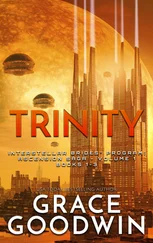Sedgwick stared bleakly into the nurse’s sad smile. “Why?” he asked. “Why can’t I make you understand?”
“I do understand,” she said softly. “No more morphine.”
Sedgwick’s eyes darted to the President’s intravenous tube, then to his own. His legs throbbed. He looked back at the nurse in confusion.
“Blood serum,” she said. “Nothing else. He’s going to hurt, but he’s going to think.”
Sedgwick closed his eyes. “Bless you,” he said. “God bless you.”
The nurse looked at him desolately. “Is it going to do any good?”
“I don’t know, miss. I really don’t know.” Sedgwick had no idea how SIOP had scheduled the submarines. He was reasonably certain the President did not know either, having had no time for detail before the mad dash out of the White House to Nighthawk One. But Sedgwick knew there was a schedule. In his mind he could see them lurking, ready. He was Navy, and there always was a schedule for the submarines. At 1750 Zulu, it couldn’t be far off.
“How long before he’ll be coherent?”
The nurse wrinkled her forehead. “Half-hour. Forty-five minutes maybe. He’ll be pretty rummy at first. He’s been off it almost an hour now. You”—she cleared her voice in mock approach—“you’ve been off it a while longer.” She chuckled. “You’re the kind of patient who makes hospital legends, sailor. We get a lot of bedwetters. But that was a new one.”
Sedgwick noticed for the first time that his sheet was dry, changed after he had passed out. People doing their jobs, he thought. All kinds of jobs. As trained.
“Is there anything you can do to bring him around faster?”
“Not much, I’m afraid. We could shoot something into him to hop him up now that we’ve knocked him down. It’d be very dangerous. And I truly don’t think it would do any good. You’d probably have a babbling chimpanzee on your hands. Not the President you need.” She paused. “Are we really in that much trouble?”
“I’m afraid so,” Sedgwick answered. He felt the nurse shudder and pull her hand away. He looked at her and saw eyes that retreated in guilt, not fear. He reached for her hand.
“I’m sorry we screwed things up,” she whispered.
He squeezed the hand he had wrenched a half-hour earlier. “Believe me, nurse,” he said, “you aren’t the ones who screwed up.”
After the sudden and violent gust of wind cleaned out the B-52, the air pressure inside the cabin stabilized with the pressure outside. The wind stopped almost immediately, replaced by the barely perceptible rustle of thin air racing over the escape hole Halupalai had left in the top of the plane. Even as they began their rapid descent, Kazakhs reached forward and stripped his glove off the green screen, his hand becoming infinitely colder even than his contempt for the world that had placed him in this mess. The temperature had plummeted more than one hundred degrees in a split second. The pressure fell to less than three pounds per square inch, one-fifth of normal. The nitrogen in their body fluids began to form bubbles. Unless they descended quickly, they would begin to suffer from ailments ranging from the bends to paresthesia to uncontrollable choking. With the air outside their bodies thinning by a factor of five, the gases inside their stomachs and intestines expanded by a factor of five. The pain stabbed. Todeal with this irritation, they had to vent the expanded gasses through both available bodily orifices. This they did, without shame. Otherwise, they rode silently downward—each drawn deeply within, each depressed, each having more difficulty with the emotional stress than the physical stress.
Moreau did not look back. Kazakhs looked once, confirming with a quick glance that Halupalai’s seat was gone, his buddy gone with it, and that they now had a gaping and irreparable hole in the top of their aircraft. Kazakhs made the rest of the descent feeling as if the hole had been torn through him. They leveled out at twelve-thousand feet, unsnapped their oxygen again, and quietly flew on, wordlessly telling each other that neither was ready to begin the discussion of their new dilemma. Kazakhs finally broke the silence. “The son of a bitch,” he said, his words emerging in a low, tormented hush. “The poor, dumb, wonderful son of a bitch. Damn him.” He pounded a newly gloved fist into his knee in hurt and frustration. “Why, Moreau? Why?”
Moreau stared straight ahead, unmoving. “He wanted to go home,” she said flatly. “He was happy there.” She fought against the shivering, still trying to shake the subzero cold out of her bones and adjust to the marginal warmth they had found. “Maybe mat’s what we should have done, too.”
Kazakhs turned to look at her questioningly. She continued to stare ahead, her oxygen mask hanging loosely below a clenched jaw. “Were you happy there?” he asked.
Her brow furrowed briefly, memories of the past Christmas flooding her mind. She had asked her father close to the same question. “I don’t think: happiness is one of the goals I set in life,” she replied, almost exactly as he had.
Kazakhs turned away. He peered out the cockpit window at the vast and vacant sea scarcely more than two miles below them now, its whitecaps clearly visible atop giant swells. It showed no sign of hostility, no sign of tampering, no clutter of crud and bodies. It was pure. Kazakhs, conveniently blotting out the possibility of a faulty and mangling ejection, envisioned Halupalai in it. His friend bobbed placidly in the swells, basking in their peacefulness, no more rejection, no more failure, not bothering to open his rubber raft, not bothering to begin the long and pointless search for a home that was long gone. He knew Halupalai wasn’t going home. Kazakhs sighed. “Our lovable beachboy didn’t do us any favors, bless his lost soul,” he said.
“I know.”
“We got ourselves some real problems.”
“Yes.”
“You serious about going home?” He looked at her intently. He had no intention of making the same lost search that Halupalai had begun.
“Could we make it?”
“How’s our fuel? Hundred thousand pounds?”
“Ninety-six.”
He ran it through his head for curiosity’s sake. San Francisco lay 2,500 miles away. Fiji roughly the same. The westerlies would help them, although not much at this altitude. With the new drag, their fuel would give them four hours, four and a half perhaps. “A chance,” he said. “My guess is we’d paddle the last couple hundred miles. Through the crud.” He added a bite to his last sentence.
Moreau didn’t appear to notice. “Maybe we ought to face reality,” she said blankly. Her voice was devoid of all life.
“Reality?” He let the word sit a minute. “If we’re lucky, reality’s a firing squad, Moreau.”
She smiled faintly. “And if we’re unlucky, commander?” she asked, the question suddenly abrasive.
“Planet of the apes, pal. They won’t even care who we are.”
“Shit!” Moreau exploded, stopping the unintentional game.
“Cherepovets,” Kazakhs said calmly. “Zebra two-one, Moreau. They went for the gonads. The other guys must be going for ours. Who’s going to turn it off? Halupalai’s out there looking for an island that won’t be there if he ever finds it.”
“Dammit.” The edge started to back off her voice.
“You know the system better than I do. It has to go. Maybe they’ll dig out of the rubble someday.” He paused. “I don’t want to spend the rest of my life digging.”
Moreau lurched across the throttles between them. She pounded tight fists angrily into the pilot’s chest and arms. He sat stolidly, allowing the thrashing to continue until finally she slumped back into her seat. “Dammit,” she said despairingly. “Dammit, Kazakhs, I feel so guilty.”
Читать дальше












